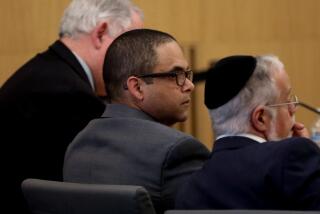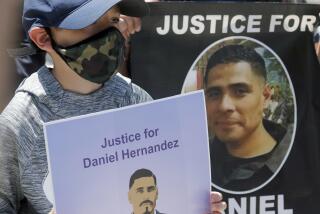‘American Sniper’ viewers won’t necessarily be barred from jury, judge says

Potential jurors in the “American Sniper” trial are being questioned in a heavily secured Texas courtroom.
A judge told potential jurors in the murder trial of the man accused of shooting “American Sniper” author and Navy SEAL Chris Kyle that reading the victim’s book or seeing the popular movie based on it would not automatically disqualify them from the case.
About 400 people were summoned Thursday and 189 showed up at this small town’s courthouse for the first day of jury selection in a trial that is drawing national and international attention, stoked by the Oscar-nominated film. Another 400 were summoned to appear on Friday.
The suspect, Eddie Ray Routh, 27, has been charged with two counts of murder and one count of capital murder in connection with the shootings of Kyle, 38, and his friend Chad Littlefield, 35, killed two years ago when the trio went to a firing range for target practice.
Routh, a former Marine, appeared in court Thursday looking very different than he did in his mug shot, having shaved his shaggy brown hair and gained weight. He appeared calm as he chatted with his attorneys in front of prospective jurors.
Courthouse security had been stepped up for the trial. Potential jurors had to leave cellphones and bags in their cars, pass by police dogs and go through two metal detectors. More than a dozen members of law enforcement stood in and outside the courtroom.
A bomb threat against the courthouse was called in to the local newspaper Jan. 26. The sheriff’s office is still investigating, according to Chief Deputy Jason Upshaw, who was among the first responders at the scene of the gun-range shootings on Feb. 2, 2013.
State troopers temporarily closed a stretch of the main highway through town Thursday morning when sheriff’s deputies escorted Routh to court from the nearby county jail, where he has been held in lieu of $3-million bail, Upshaw said.
Kyle became legendary for his prowess as a sniper during his four tours in Iraq, popularized by the “American Sniper” autobiography published after his return. The book was turned into a movie directed by Clint Eastwood and starring Bradley Cooper, which has been nominated for Academy Awards for best picture and best actor. The film is still in theaters, where it became a sleeper hit across the heartland, particularly in Texas.
Stephenville, about 100 miles southwest of Dallas, is a college town and seat of largely rural Erath County, with a population of about 40,000. The first potential jurors called were mostly white, including some gun owners wearing camouflage hunting caps and jackets.
District Judge Jason Cashon excused, exempted or disqualified 39 of those who had been summoned, including some who said they had already made up their minds about the defendant’s guilt.
Chris Conway, 40, of Stephenville was dismissed after he told the judge he had become convinced of Routh’s guilt. Conway, the band director at a local middle school, said he followed news of Kyle’s death and considered him a hero.
He said he knew that Routh’s attorneys planned to mount an insanity defense, potentially based on Routh’s military service in Iraq and Haiti and subsequent treatment at Veterans Affairs facilities for what relatives described as post-traumatic stress disorder.
“I didn’t buy it,” Conway said.
Vietnam veteran Joe McCartney, 63, of Stephenville told the judge he didn’t think he could serve on the jury because he is being treated for PTSD and had little sympathy for Routh.
“There’s stuff out there he could have done other than what he done,” McCartney said after he was excused by the judge.
Other people were released for reasons such as illness, work, child care and illiteracy.
Lucas Burch, who teaches at an online university, was excused because he is scheduled to leave soon for a school trip to Costa Rica and Italy. Burch, 33, of Stephenville, had seen “American Sniper” and followed news of the case.
The district attorney is not seeking the death penalty, but Routh faces the possibility of life without parole.
“I don’t know if I would want to be on that type of a trial with a man’s life on the line,” Burch said.
Burch, who came to court carrying an earmarked copy of historian David McCullough’s “1776,” said Erath County has “a large number of educated people who care about their country.”
“I would hope they would be as fair as they can,” Burch said. “It’s something we all follow in the news.”
“Everyone has heard about the case,” said accountant Sherilyn Svien, 59, who walks with a cane and was excused Thursday for medical reasons.
Prospective jurors who were not released Thursday were asked to return Monday to be questioned by the lawyers involved, all of whom were in court Thursday.
Svien said she would have liked to have served on the jury deciding Routh’s fate.
“He certainly can get justice. Out of the 800 jurors, I’m sure they can find 12 who have not concluded what they would do,” Svien said as she left court. “This is not a hick town, despite what people may think. We try to do the right thing. This is a town of high moral character.”
Legal experts said one of the challenges in picking a jury would be screening out those so eager to participate that they try to conceal their biases.
Nathan Goldberg, 33, had hoped he could serve on the jury, but told the judge he had moved outside the county and was automatically disqualified.
Goldberg, a technology worker, is an Army veteran who crossed paths with Kyle in Iraq. He has also suffered from PTSD from his time in Iraq and Afghanistan, where he was a forward observer, he said.
“Having an understanding of both sides, I thought I might have a good perspective” on the case, Goldberg said. But the veteran said he spoke with others summoned Thursday who also had military experience.
Standing outside the courthouse, Goldberg remembered Kyle as the consummate soldier and “a hell of a shot.”
As he left, Goldberg said he hoped the trial would result in justice for both men.
“I would like to see that Eddie Ray gets the help that he needs,” he said.
As Cashon dismissed prospective jurors, who would file out past a bank of television and still cameras, he reminded them that they would be returning Monday to be questioned again by lawyers involved in the case, a process called voir dire.
Once the trial starts Wednesday, relatives of the accused and the victims are expected to be in court.
The judge has issued a gag order barring those involved in the case from discussing it.
“There’s going to be a lot of publicity,” Cashon told the potential jurors before they left. “Stay away from it.”
After he finished the day’s questioning, the judge held a hearing on whether a reporter had violated his order. Cashon called several journalism students from nearby Tarleton State University to testify about having seen a reporter questioning a potential juror during lunch break.
The students said they had seen a reporter for the British newspaper the Independent questioning a man even after he said he was a prospective juror and could get in trouble for talking about the case.
The judge said the reporter, David Usborne, had signed in Thursday and signed a media agreement that specifies reporters cannot speak with juror candidates.
Usborne, who was at court Thursday but not at the hearing, is listed as the New York-based U.S. editor for the Independent and writes a weekly column. A story he posted Thursday did not include interviews with jurors.
The judge found Usborne had violated the court order and entered an order that the journalist would have to show cause why he should not be found in contempt and banned from the proceedings.
“What a way to learn about journalistic integrity,” Cashon told the students.
molly.hennessy-fiske@latimes.com
Twitter: @mollyhf
More to Read
Start your day right
Sign up for Essential California for news, features and recommendations from the L.A. Times and beyond in your inbox six days a week.
You may occasionally receive promotional content from the Los Angeles Times.







